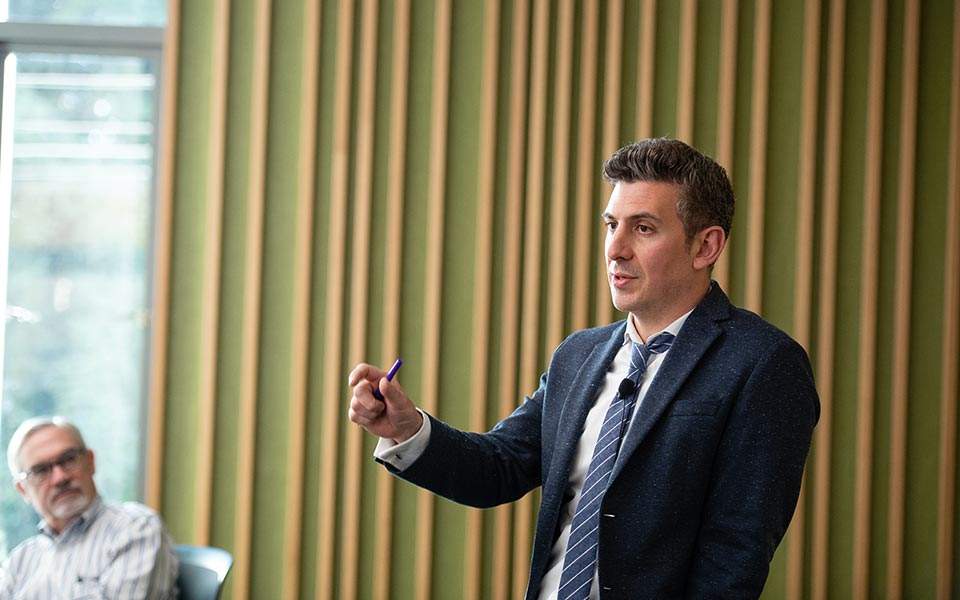Greek academic reaps distinction at UC Berkeley

Panos N. Patatoukas’s ascent during his eight-year career in one of the most competitive academic environments in the world has been nothing short of stellar, and now he has received the Distinguished Teaching Award at the prestigious University of California, Berkeley. It is an award like few others, expressing the recognition not just of his colleagues at the world-famous US public research university, but also of his many students across a variety of programs, including undergraduates, MBAs and PhDs.
A graduate of the Athens University of Economics and Business, with a master’s from the London School of Economics and a PhD from Yale, the Greek tenured associate professor and star of Berkeley’s academic community is just 37 years old but has already gained a reputation for his instructional inventiveness on the tough subject of financial information analysis and his ability to engage students with very diverse academic and professional backgrounds. His accomplishments – all the more impressive given his youth – led Kathimerini to seek him out for an interview.
Have you ever felt uncomfortable for not being an American where you are?
If you’re not from here and you have an accent, you sometimes have more to prove, that’s all. Speaking of my experience at Berkeley, the overall impression is of a very sheltered environment, very international and cosmopolitan. I am well aware that it is perhaps one of the more attractive versions of life in America and I often catch myself wishing I didn’t know what was going on outside of it.
How are you enjoying life at a university with such a liberal mentality at a time when Donald Trump is in the White House?
What I appreciate and admire about Berkeley is that its democratic and liberal identity is genuine. You would expect it to be at the vanguard of reaction against Trump, but that is not the case. In contrast, a careful observer will see how much sensitivity there is for every opinion to be heard. I’ll give you an example: Milo Yiannopoulos [the British commentator known for his extreme views and staunch support for the US president] was due to speak here last September. While a few people were absolutely livid at the prospect, the university stepped in to guarantee his safety and to ensure that the talk would go ahead.
Can you take us back to your first day of teaching, when you were just 29?
It was an intense day. I remember I arrived hours before the class was scheduled to start and sat in the classroom, waiting. At some point, the first students appeared. It was two women, apparently older than me, and they started teasing me. They couldn’t believe I was the professor: One even pinched my cheek, saying, “No way you’re the prof!” Since I teach financial information analysis at the executive MBA level and the subject matter is of broad interest, the students’ age range is much wider compared to other graduate courses. I work with people in their 30s and 40s and when I started teaching I was much younger than most of my students. The challenge was to earn their respect not by being strict or throwing my weight around as a professor, but rather with my knowledge, my love for the material and my efforts in the academic field. Beyond age, accents and appearances, the only thing that matters to them at the end of the day is whether they can learn something from you.
Does the award concern the content of your classes or your teaching style?
Both. When I first started teaching eight years ago I only had 20 students. The subject of the class can be dry so I try to bring “soul” to financial analysis and tell the story behind the data and financial ratios. Today my classes are packed with students who not only appreciate the material but also my unique approach to teaching financial analysis.
You teach a subject that is not new but appears to be attracting fresh interest because of your personal approach. This is one of the reasons why you were awarded after all, right?
Indeed, financial analysis is a popular subject. It deals with age-old questions related to the definition and measurement of economic value, the drivers of corporate value creation, forecasting economic performance using financial statement analysis, and understanding how capital market participants use and process financial data. The basic premise of my efforts is to mitigate what I refer to as the problem of “access inequality” to financial information. While institutional investors have access to models and vast amounts of data that they use to make investment decisions, the typical individual investor does not have access to such models and data and lacks expertise. The common thread of my work is the idea of democratizing the power of financial analysis through the combination of financial education and technology. My mission is to make financial analysis accessible to everyone and help individual investors make more informed investment decisions.
Isn’t that what financial consultants are for?
Yes, but they cost money, often more than what they deserve since a lot of the information is out there, waiting for us, for free. What I try to provide my students with is a framework for financial information analysis that will enable them to filter through data in a simple yet comprehensive way when making investment decisions.
So you are basically creating a new kind of expert adviser, this time with the Berkeley stamp.
No at all. Quite the opposite. My objective is to bring the power of financial information analysis to the people and mitigate the problem of access inequality, to spread financial education beyond the limits of our university, because this is exactly Berkeley’s philosophy.
And how will you achieve that?
By creating an application. The combination of financial education and financial technology creates unique opportunities to materialize my vision of bringing the power of financial analysis to the people. This is my own initiative and I am covering the cost. I have actually assigned part of the development to a company based in Athens, which is another reason, besides family, why I want to visit Greece as often as possible.
Do you have a timeline?
I’m hoping that we’ll be ready by the end of the year. Then there will be a test period for feedback with my students, who have a very good idea of what I am trying to achieve.
How much will the app cost?
It will be free.
Why?
Because otherwise I would have to face a huge internal conflict: On one hand I am creating a platform that attempts to democratize the power of financial analysis, but on the other hand charging for that democratization? That would not make sense to me.
Your resume is full of distinctions even though you are only 37. How did you achieve that?
I grew up in [the western Athens suburb of] Peristeri and I had no idea of where I’d be at 30 or 37. You could say there was some element of serendipity in the things that happened for me, but I assure you I seized the opportunities that came my way. I was ready. I need to mention that my parents never pressured me. I say this because I see parents who want to plan their children’s lives to a T. In my opinion, what parents need to do is raise their children so that they can adapt to changes, make the most of opportunities that come their way, and deal with setbacks, because life does not always move in a straight line.
* This article first appeared in K, Kathimerini’s Sunday magazine.




